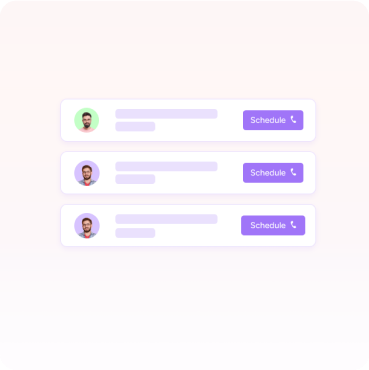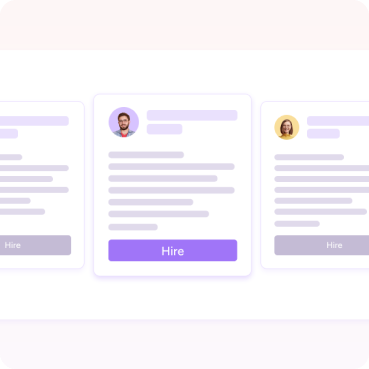Regular hiring
High RiskHire Programmers of Silicon Valley caliber
Hire pre-vetted full time remote Programmers from India. Hire now and build your dream engineering team with Hyno
Join 4,000+ companies already growing








Our Top Remote Developers
Hyno conducts rigorous testing and carefully vets the developers who are fueled by passion and skill sets. Hence, our developer community is the foundation for innovation and collaboration, bringing ideas and projects to fruition.
OUR STANDARDS
Hyno vs. Your regular recruitment process.
Find a risk-free, pre-interviewed, high-quality developer who is remote-ready in less than 2 weeks at 40% less cost.
Parameters
Choose the right for your firm.Time
Fees
Quality
Pre Screening
Remote readiness check
Termination
Failure rate
1 - 4 Months
> $1000
High
Low
Freelancing
High Risk1 - 2 Months
No fee
No
Very high
 Low Risk
Low Risk
0 - 15 Days
No fee
No
Very low
Pricing Starts from $35/hr
Accomplishing everything in just 3 steps
Our technical manager aligns the required skillset and tech stack with our talent pool to help you find the best fit.

Shortlisting candidates
Precise Hiring: Understanding, Gathering, and Shortlisting nittygritty.
-
 We start by thoroughly understanding your unique needs and specifications.
We start by thoroughly understanding your unique needs and specifications.
-
 check markWe
align the developer details with company goals. This way, we tailor the candidate
selection to seamlessly integrate with the organization’s vision and goals.
check markWe
align the developer details with company goals. This way, we tailor the candidate
selection to seamlessly integrate with the organization’s vision and goals.


Scheduling an Interview
Effortless talent selection: Finding your perfect match
-
 We connect you with the chosen candidates to ensure a personalized experience.
We connect you with the chosen candidates to ensure a personalized experience.
-
 Our rigorous
selection process guarantees that you find candidates who align seamlessly with your
requirements.
Our rigorous
selection process guarantees that you find candidates who align seamlessly with your
requirements.


Onboarding the talent
Streamlined onboarding for peak performance.
-
 The selected/qualified talent integrates smoothly through structured onboarding to
quickly adapt to projects, processes, and team dynamics.
The selected/qualified talent integrates smoothly through structured onboarding to
quickly adapt to projects, processes, and team dynamics.
-
 We go beyond
integration to offer ongoing support for a seamless transition to ensure that the
new talent exceeds your expectations.
We go beyond
integration to offer ongoing support for a seamless transition to ensure that the
new talent exceeds your expectations.


Read hiring guide
A one-stop shop to hiring the right Programmers
How to hire a Programmer? Skills to look for, interview questions, and more
Hiring a dedicated developer for your business can
be a cumbersome task. As many companies are competing to hire top Programmer, so
finding a good developer is not as easy as it may seem.
We're here to assist all employers who choose to hire Programmer on their
own. Recruiting a developer on your own requires a fair amount of software
development experience in general. However, if you're a non-technical manager
interested in learning more about how to hire a Programmer, we've put up
an excellent resource for you.
Things to check Key Skills Required for a Programmer?
The following are the key skills that a developer should possess to become proficient in Programmer
1. Programming languages - Depending on the specific job requirements, a programmer should have expertise in one or more programming languages such as Java, Python, C++, JavaScript, PHP, Ruby, or Swift.
2. Algorithms and data structures - A programmer should have a strong understanding of algorithms and data structures, and be able to implement them effectively in code.
3. Object-oriented programming (OOP) - A programmer should be skilled in OOP concepts and be able to design and implement object-oriented code.
4. Software development lifecycle (SDLC) - A programmer should have a good understanding of the SDLC, including requirements gathering, design, implementation, testing, and maintenance.
5. Debugging and testing - A programmer should be proficient in debugging and testing code, including using debugging tools and techniques to identify and fix bugs.
6. Version control - : A programmer should be familiar with version control systems such as Git, and be able to use them to manage code changes and collaborate with other team members.
7. Database management - Depending on the specific job requirements, a programmer should be able to work with databases, including designing and implementing database schema, writing SQL queries, and integrating database functionality into applications.
8. Web development - : If the job involves web development, a programmer should be proficient in web technologies such as HTML, CSS, JavaScript, and related frameworks.
9. Operating systems: A programmer should be familiar with operating systems such as Windows, Linux, or macOS, and be able to develop software that runs on these platforms.
10. Cloud computing -: A programmer should have some understanding of cloud computing concepts and be familiar with cloud platforms such as AWS, Azure, or Google Cloud, depending on the specific job requirements.
Ideal hiring process for hiring a remote Programmer
1. Define the job requirements:: Start by defining the job requirements, including the required technical skills, experience, and qualifications. This will help you create a clear job description and target the right candidates.
2. Post the job Post the job on relevant job boards, social media platforms, and professional networks. Be sure to include a detailed job description and information about your company culture and values.
3. Screen resumes and applications: Review resumes and applications to identify candidates who meet the job requirements. Look for relevant work experience, technical skills, and education.
4. Conduct initial interviews: Conduct initial interviews via phone or video call to screen candidates further. This is an opportunity to ask about their experience, skills, and work style, as well as to assess their communication skills.
5. Technical Assessment: : Conduct a technical assessment, such as a coding test, to evaluate the candidates' technical skills. This can be done through a coding challenge or a technical interview. Make sure to tailor the assessment to the specific role and technologies used in your organization.
6. Second Round of Interviews: Based on the results of the technical assessment, schedule a second round of interviews with the top candidates to assess their soft skills and cultural fit.
7. Check References: Before making a job offer, conduct reference checks to verify the candidate's employment history and performance in previous roles.
8. Offer the Job: Once the reference checks are completed, make a job offer to the selected candidate. Be sure to discuss the terms of the position, including compensation, benefits, and remote work arrangements.
9. Onboarding: Once the candidate has accepted the job offer, start the onboarding process, which includes setting up their workspace, providing access to tools and resources, and introducing them to the team and company culture.
10. Ongoing Support: Provide ongoing support and feedback to the new remote employee to help them integrate into the team and ensure their success in the role.
Important Interview questions to ask to Hire a Programmer
What experience do you have in [specific programming language]?
The candidate should provide specific examples of their experience using the programming language, including projects they have worked on and challenges they have overcome.
How do you approach problem-solving in your programming work?
The candidate should describe their process for identifying and solving problems, including how they gather information, analyze the problem, and develop a solution.
How do you ensure the code you write is maintainable and scalable?
The candidate should describe their approach to writing code that is easy to maintain and scale, including using appropriate design patterns, commenting their code, and following coding standards.
Can you walk me through the development lifecycle of a recent project you worked on?
: The candidate should provide a high-level overview of the project, including the requirements gathering process, design, development, testing, and deployment.
Have you worked with any version control systems?
If so, which ones? Answer: The candidate should describe their experience using version control systems, such as Git or SVN, including how they use it to collaborate with team members and manage code changes.
How do you ensure the code you write is secure and protects user data?
The candidate should describe their approach to writing secure code, including using encryption, following best practices for authentication and authorization, and testing for vulnerabilities.
Can you give an example of a particularly challenging programming problem you faced and how you solved it?
The candidate should describe a specific programming challenge they faced, including how they analyzed the problem, developed a solution, and tested and refined their approach.
How do you stay up-to-date with the latest programming trends and technologies?
The candidate should describe how they stay informed about the latest programming trends and technologies, including attending conferences, following industry blogs, and participating in online communities.
How do you approach working remotely and collaborating with team members who may be in different time zones?
The candidate should describe their experience working remotely and how they maintain communication and collaboration with team members, including using video conferencing, chat apps, and project management tools.
Can you describe a time when you had to refactor code for performance optimization?
The candidate should describe a specific instance when they optimized code for better performance, including what they did and how it impacted the performance of the application.
Job Description Template for Programmer
Location: [Insert Location]
Job Title: .NET Developer
Position Type: Full-Time
Salary: [Insert Salary Range]
We are seeking a talented and experienced .NET Developer to join our team. The successful candidate will be responsible for developing and maintaining web-based applications using the .NET framework. As a .NET Developer, you will be working in a collaborative team environment, utilizing your skills to develop and deliver high-quality software solutions.
Key Responsibilities:
- Design, develop, and maintain software applications
- Write clean, maintainable, and efficient code
- Test and debug code to identify and resolve defects
- Collaborate with team members to identify and implement software improvements
- Stay up-to-date with emerging programming trends and technologies
- Participate in code reviews to ensure code quality and consistency
- Document code for future reference and maintainability
Requirements:
- Bachelor's degree in Computer Science or related field
- Proven experience as a programmer or related position
- Strong programming skills in one or more programming languages (e.g., Java, Python, C++, etc.)
- Experience with database management systems (e.g., MySQL, Oracle, SQL Server, etc.)
- Familiarity with version control systems (e.g., Git, SVN, etc.)
- Excellent problem-solving skills and attention to detail
- Ability to work effectively in a team environment and collaborate with others
- Strong written and verbal communication skills
If you are a skilled programmer with a passion for innovation and a commitment to excellence, we encourage you to apply for this exciting opportunity. We offer competitive compensation, excellent benefits, and a dynamic work environment where your skills and contributions will be valued.